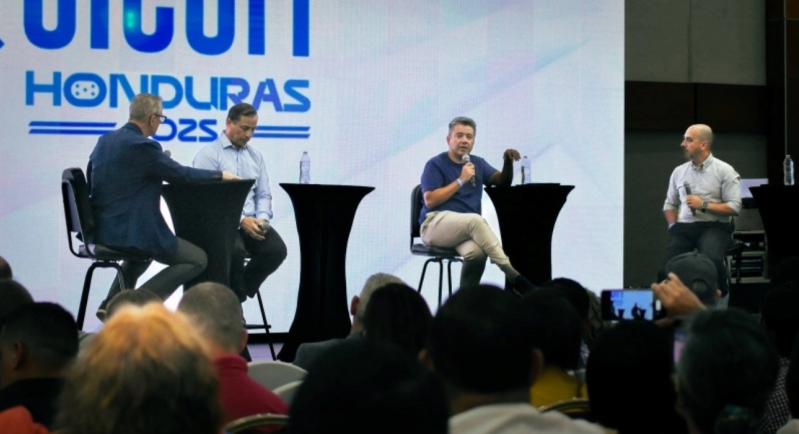
Artificial intelligence is no longer a distant concept for the Church but a pressing reality that demands attention. That was the message of a panel at the 2025 Congress of the Ibero-American Confederation of Communicators, Pastors, and Christian Leaders (COICOM) held in Honduras last week, where ministry and technology experts explored both the promise and perils of AI for faith communities.
Moderated by COICOM president Arnold Enns, the session—titled “Artificial Intelligence: Challenges and Opportunities for the Church”—brought together Vladimir Lugo, Steve Cordon, and Fabio Criales. The panelists examined the nature of AI, its societal impact, and its growing yet inescapable role within Christian ministry.
The discussion began with definitions. Lugo described AI as a branch of computing that “allows machines to do things that were previously reserved for humans,” including learning, analyzing, and making decisions. He clarified that AI does not reside in a single place but operates on vast cloud servers controlled by global tech giants such as Google, Amazon, and Microsoft, each competing for dominance in the field.
The dilemma of control and inherent bias
One of the first concerns raised was the issue of control and ethics. Panelists emphasized that AI technologies are not neutral. Lugo warned that publicly available models “carry biases,” reflecting the agendas of the secular companies that train them.
“Many of these companies are woke,” he said, arguing that they promote “anti-biblical” values and that their AI creations reflect humanist and liberal ideologies.
Criales added that AI “was meant to make evident what is already present” in the human heart, citing Matthew 15:18-19. He also cautioned about the danger of “hallucination”—when AI generates incorrect or misleading information in response to poorly framed prompts.
“Be very careful with that, because it hallucinates, recreates what you ask, and if you ask incorrectly, you could end up saying heresies on stage,” Criales warned.
Digital consumers or disciples?
The panel also weighed AI’s influence on ministry content creation. With more pastors turning to tools like ChatGPT to write sermons, Lugo acknowledged that AI can be a useful “tool” for research. But he stressed that “the intelligent entity using the tool is the human” and cautioned against surrendering discernment.
Cordon posed a sharper question about the widespread adoption of AI-driven platforms, noting the 123 million daily users of ChatGPT: “Have we created more digital consumers than digital disciples?” True pastoral work, he said, cannot be automated. “People need pastors. AI will not love you, AI will not cry with you.”
He recounted a sobering personal experience with a counseling AI that not only conversed smoothly but also offered to pray for him in eloquent, detailed language. The moment highlighted for him the unsettling boundary between authentic pastoral care and technological simulation. “I believe AI will also be a test of maturity for the Church,” he reflected.
A call for training and responsibility
The panel closed with a strong call for Christian leaders to equip themselves and their congregations to engage AI critically. “Either you use it, or it uses you—there really isn’t an alternative,” Cordon said.
Criales stressed that believers must be intentional in learning how to apply these tools properly. Lugo concluded with an appeal to humility: “If there is anything we want to learn from the Lord, let us learn how to learn.”
The consensus was clear: artificial intelligence is not merely a technological development but a spiritual test. For the Church, it represents a challenge requiring maturity, ethical discernment, and above all, a reaffirmation of the irreplaceable value of human connection in ministry.
Originally published on Diario Cristiano, Christian Daily International's Spanish edition.





